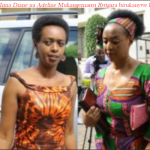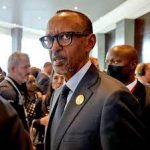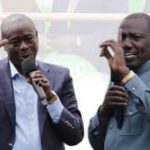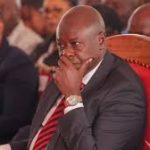Why William Ruto must become President before 2022 election
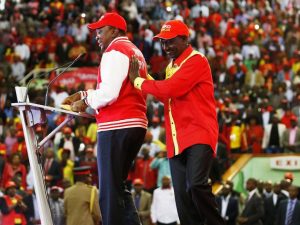
President Uhuru Kenyatta (L) and His deputy William Ruto launch of the Jubilee Party Membership Smartcard at Kasarani on January 13, 2017. Photo/Jack Owuor When Energy CS Charles Keter founded the United Republican Party in January 2012, he adopted the slogan ‘Kusema na Kutenda’ which translates to ‘Word and Action’.
Unwittingly or otherwise, he had adopted the very same slogan once used by Gema – the powerful tribal alliance that brought together the Gikuyu, Embu and Meru forming the acronym. Gema had dominated national politics in the seventies and its patron Njenga Karume had the same sway over the members of the organisation although nothing close to what Raila Odinga has with Nyanza. Gema adopted the slogan ‘Kuuga na Gwika’ which, simply put, is just ‘Kusema na Kutenda’
It is not immediately clear what the URP had in mind when they adopted the same slogan but it appears to have been a subsumption of the power the now defunct organisation had over the Gema people. People always love slogans that have worked before. William Ruto piggybacked on the party and positioned it for a major take-off. In the 2013 election, it swept seats right across the country. His unity with Uhuru Kenyatta’s The National Alliance brought us to a near similar to position Kenya was again in 1973. So powerful was Gema that time that in the election held the following year, the candidates it endorsed nearly all won seats in its territory. Now think of Gema as URP and think of TNA as Kanu and you will see what Jean-Baptiste Karr meant when he said that the more things change, the more they remain the same.
GEMA’S ALTER EGO
In many ways, Gema was the prop that Kanu leaned on in its Central Kenya strategy. Virtually all the MPs and Kanu bosses were card-carrying members of Gema. In 2013, URP was the prop that Jubilee Alliance leant on in its Rift Valley strategy. So it could be just as well if URP had made their slogan ‘Kemwa ak Keyai’. URP was Gema’s indubitable doppelganger. But don’t be fooled that URP really dissolved and joined Jubilee. It’s core remains intact just as Gema’s does. The URP affirmed the cult of Ruto and its core will stop at nothing until he becomes President.
SUCCEEDING UHURU KENYATTA
We are entering a period that will be characterised more by the intrigues of succession. Just as it was in 1970s. At that time, Gema set itself on the succession debate with the mind to keep power in the mythical ‘House of Mumbi’. Its biggest lieutenant was Kihika Kimani, whose daughter Senator Susan Kihika is today (ironically), a great ally of Ruto. Her father had no time for Vice President Moi nor did Njenga Karume, who was the chairman of Gema. The succession debate quietly began as early as 1966, when Jomo Kenyatta suffered a heart attack, and this caused his cousin, Dr Njoroge Mungai, a medical doctor no less, to closely monitor his health. He later suffered a slight stroke in May of 1968, prompting even closer monitoring. Dr Mungai even caused a Medical Doctor to constantly accompany the President wherever he went, disguised as a district officer. Essentially, the Mzee was living on borrowed time and it was right for them to discuss his succession. In the middle of the two health scares, in January 1967, Daniel araap Moi entered the scene as the heir apparent to Kenyatta. The thought of a Moi presidency was quickly abhorrent to the inner Gema circle, which preferred instead to have Mbiyu Koinange or anyone else succeed Kenyatta.
BACKSTABBING BOSS
The succession debate was something of an ill wind that just couldn’t go away. In the next few years, it became increasingly hotter. At some point, it moulted into the ‘Change-the-Constitution’ movement, which was meant to bar the automatic accession of the Vice President to the presidency. At this time, everybody thought Kenyatta was solidly behind his deputy. At least that was the perception he portrayed in public. However, in private, it is now very clear that President Kenyatta was behind the Change the constitution thing all along.
At a 1977 rally hosted at Tinderet Secondary School (now Kilibwoni High School) in Nandi called to drum up popular support for the Change-the-Constitution movement, all its protagonists led by Kimani, Mungai, Karume and more, were hosted by Tinderet MP Gerald Kalya. Speaker after speaker insisted that Moi could not become President and during a break, Kalya was taken by Kimani to the school staff room where President Kenyatta was getting a minute-by-minute account of what was going on through the school telephone. Holding the handset, he gave it to Kalya, who very surprised to speak to Kenyatta on the other end. Kenyatta told him to ‘keep up the good work…’ It is not clear why Jomo Kenyatta did not outrighly sack Moi immediately but sure enough, he was not Moi’s biggest fan. But Jomo Kenyatta was living on borrowed time. His heart gave way in Mombasa exactly one year later.
RUTO AND 2022
Deputy President William Ruto will probably not encounter the kind of resistance that Moi had but what is sure, is that there will be several situations that might just make it difficult for him to be president. Already, the record of succession of any deputy to the throne is at best poor and at worst impossible. There has never been a vice president in Kenya who directly went on to become President succeeding their boss through an election while in the same party. Kibaki only became President through an opposition-led coalition that ended Kanu’s reign which by 2002 was indeed a spent force. It had died back in 1966 and its zombie continued terrorising Kenyans until 2002, when Kibaki chopped off its head.
So, this is the reality facing Ruto ahead of 2022. He could just wait until that day to make his presidential bid but then he could just fail under what we described a while back as the curse of deputisation.
THE CURSE OF DEPUTISATION
The country which has had the most vice presidents in its history is the United States. They adopted the Presidential system in 1776, when George Washington successfully defeated the British and declared independence in July of that year. Since then, there have been 48 vice presidents, including the current one Mike Pence. Only four went on to become President directly succeeding their bosses, although a total of 14 former vice presidents did become President. Virtually in all the regional countries, very few of its vice presidents went on to become President succeeding their bosses directly. In Kenya, Jaramogi Oginga Odinga was replaced in 1966 by Joseph Murumbi, who resigned after only three months paving way for Moi. Murumbi was reportedly very disturbed at the death of his personal friend Pio Gama Pinto in the hands of an assassin Moi has Kenyatta’s health problems to thank for becoming President. Mwai Kibaki, Josephat Karanja, George Saitoti, Musalia Mudavadi, Kijana Wamalwa, Moody Awori, Kalonzo Musyoka never became President, succeeding their bosses directly through an election. You could add Prime Minister Raila Odinga to that list.
CURSE OF THE BUILDINGS?
Some have even opined that the offices occupied while in government could just be jinxed. One is the official residence of the Deputy President in Karen, occupied by Kalonzo briefly before Ruto got in. The other is the former Shell BP house that became the Office of the Prime Minister, and which DP Ruto took over. The two houses were said to have been jinxed and could not lead its immediate occupant to ascend to the next level. Of course, Kenyans will explain failure at the polls with anything, including blaming jinxes. Perhaps aware of the potency of the jinx, DP Ruto had the building immediately re-christened Harambee House Annex, showing it to be an extension of the Office of the President. In a way, they could just be brother buildings.
NO TAKING CHANCES
While indeed the electoral landscape looks rather promising for Ruto, there is a way in which circumstances can begin to play with your chances. Raila had a very clear path to the presidency in 2013: There was no impediment to his chances and his attitude reflected as much. Until two young men appeared on the scene and, like a hurricane, turned things around against him. In short, anything can happen. You could have it all right now and in the next minute the landscape has instantly changed.
Gideon Moi still remains the thorn in Ruto’s smooth run in the Rift Valley. He acts as though Ruto does not exist and his friendship with Uhuru is in spite of Ruto’s position. A debt of gratitude remains with the Kenyatta family, who fully understand that it was President Moi who pitchforked Uhuru and thrust him on the path to the presidency. But as long as President Moi is still alive, the hopes of Gideon to become President remain alive. Gideon has tended to rely on his father to fight his political battles and has never muscled his way to the national scene without first checking what his father has to say. In fact, on the back of such hesitancy, Kanu is only surviving as a ghost. But even then, it could just pull a major upset againt Ruto.
BEING MADE PRESIDENT
Political analyst Mutahi Ngunyi once told DP Ruto that he ‘will never become President, but will me made President.’
In Kenya’s politics, it is very hard to arise politically to the highest seat on the land without some sort of deal with various sections of the country. Until the foreseeable, no single individual will occupy the presidency without cutting a substantial deal with others. So Ruto must be made President through a deal like the one that propelled Uhuru to the seat five years ago. Already, there are many quarters that are strongly against Ruto, and NASA are indeed his biggest haters. The energy he displayed on the campaign trail is unmatched. He was properly resourced, had a good message and was literally campaigning everywhere meeting people here and there. Even then, it will take more than that to overcome in 2022. He will need incumbency to be sure of 2022.
DEALING WITH THE CURSE OF DEPUTISATION
Uhuru should then step down for Ruto in 2021 just a year to the polls and let him test run the presidency. This will give him a much better chance of going through and winning in the 2022 poll. This will effectively eliminate the curse of deputisation. Of course such a proposal is likely to galvanise the opposition and make them even more determined to remove him in 2022. However, with good resources and Jubilee’s voting bases remaining solidly behind Ruto, he will then have a much better chance of making it to the presidency.
There is a strong ongoing debate as to who will become the running mate of Ruto in 2022. There are those who have positioned themselves for the Deputy Presidency, including Devolution CS Mwangi Kiunjuri, who has his lieutenants already pitching him for the seat. There are those who are betting on Governor Anne Waiguru. Again the regional politics of Mt Kenya will come to play. Among the Kikuyu, there are hot internal politics between the Kiambu group, the Mt Kenya group, the Diaspora (Kenya) group and others as to the suitability of the Deputy Presidency. We will be closely watching this space








